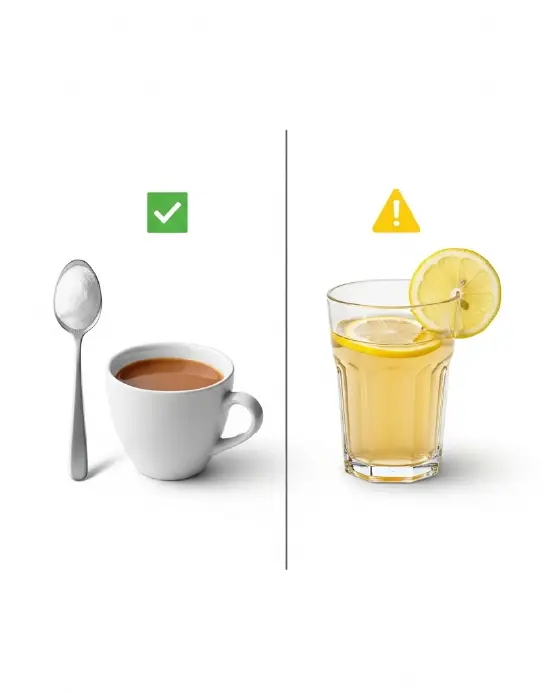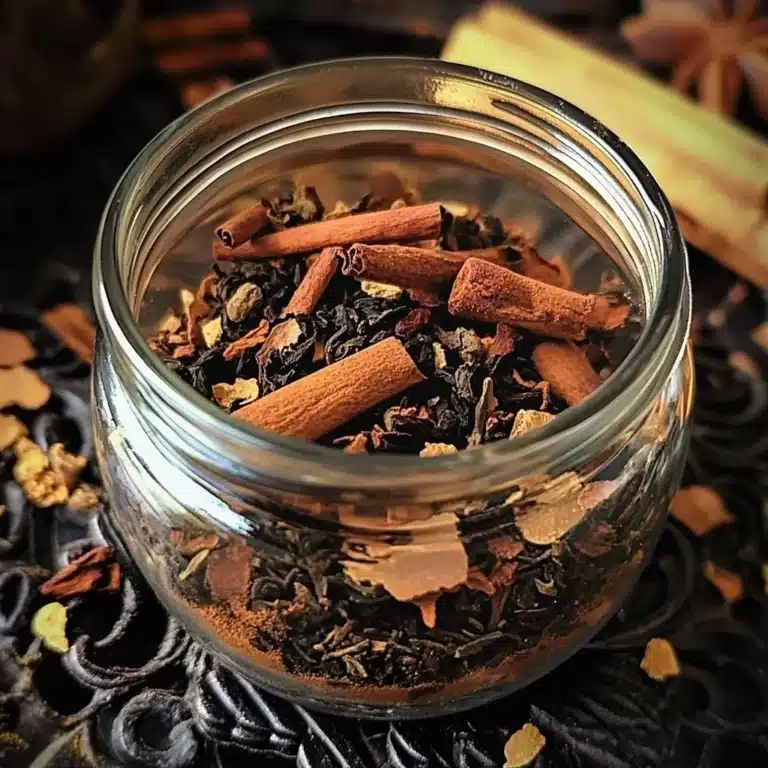Last Tuesday morning, I stood in my Nashville kitchen staring at two bottles one of baking soda tucked behind the coffee maker, and one of raw apple cider vinegar next to the honey jar. My stomach felt heavy and bloated, the way it does when you eat dinner too late and wake up still digesting yesterday.
I’d been bouncing between both remedies for months. Some mornings I’d stir a pinch of baking soda into my coffee. Other days I’d brace myself for that sharp, sour hit of diluted ACV. But here’s the thing I had no idea which one was actually helping and which one was just… well, something to do.
That’s when Grandma Dalida walked in, took one look at my mini pantry pharmacy, and said: “Olivia, when you can’t decide between two remedies, you don’t need either one. You need to understand your body first.”
She was right. So I tested them both properly this time. Two full weeks of tracking how each one made me feel, what worked for bloating, and which remedy gave me that light, settled feeling I was craving.
If you’re curious about baking soda vs apple cider vinegar for digestive relief, morning wellness, or just feeling less gassy after your coffee, this is what I learned. Real results from my own kitchen no hype, no miracle claims.

Why Everyone’s Talking About These Two Remedies
The internet loves a wellness trend. And when your grandmother and your wellness-obsessed coworker are both recommending something, you start paying attention.
That’s exactly what happened with baking soda and apple cider vinegar. From TikTok “belly fat flushes” to old-school home remedies, these two ingredients have become the go-to for anyone wanting to feel lighter, less bloated, and more energized especially first thing in the morning.
But here’s where it gets confusing: they work in completely opposite ways.
The Science Part (Without the Jargon)
Baking soda is alkaline. It neutralizes acid in your stomach kind of like pressing pause on that burning, tight feeling you get after too much coffee or a heavy meal.
Apple cider vinegar, on the other hand, is acidic. But here’s the twist: some people believe it actually helps digestion by stimulating stomach acid production and supporting the good bacteria in your gut.
They’re opposites. One calms, one wakes up. So which one do you need?
That depends on what’s happening inside your body right now. And honestly? The only way to know is to try both and pay attention.
My Two-Week Test: What Actually Happened
I didn’t want to rely on random internet testimonials or studies I couldn’t fully understand. I wanted to know how my body responded. So I set up a simple experiment.
Week 1: Baking Soda Every Morning
I added 1/8 teaspoon of baking soda to my hot black coffee each morning. Sounds weird, I know but it’s something my mom used to do when her stomach felt acidic.
The first thing I noticed? The coffee tasted smoother. Less sharp. That tight, burning sensation I sometimes get in my chest after drinking it on an empty stomach? Gone.
By day three, I realized I wasn’t burping as much after breakfast. My stomach felt calmer, less reactive. It was like putting a gentle buffer between my system and everything I was putting into it.
The downside? If I used even a little too much like 1/4 teaspoon instead of 1/8 my stomach felt weirdly flat and gassy later in the day. Too much of a good thing, I guess.
Week 2: Apple Cider Vinegar Before Breakfast
For the second week, I mixed 1 tablespoon of raw, unfiltered apple cider vinegar (the kind with the cloudy “mother”) into 8 ounces of warm water. I sipped it slowly, about 15 minutes before eating.
Let me be honest: it tasted terrible at first. Sharp, sour, borderline aggressive. I had to add a tiny drizzle of honey just to get it down without making a face.
But by day two, something shifted. I felt more awake. My digestion felt… active. Like my system was ready to process food instead of just sitting there, heavy and sluggish.
By midweek, I noticed I was more regular. Less bloated after meals. And that afternoon energy dip I usually get? It was softer, less dramatic.
The downside? If I took it without food or drank it too fast, my throat felt scratchy and my stomach cramped a little. ACV is not gentle if you’re not careful.
So… Which One “Won”?
Neither. And both.
Here’s what I realized: baking soda helps when you need immediate relief. If your stomach feels acidic, tight, or irritated especially after coffee or a heavy meal it works fast.
Apple cider vinegar helps when your digestion feels sluggish. If you’re bloated, slow, or just feel like your system needs a gentle wake-up call, ACV does the job.
They’re tools for different moments. Not rivals teammates.
What the Research Actually Says
I’m not a scientist, but I like to know what’s backed by evidence before I make something a habit. So I dug into the research and here’s what I found that actually makes sense.
Baking Soda: The Temporary Buffer
Sodium bicarbonate (that’s the fancy name for baking soda) has been used for decades to treat heartburn and acid reflux. Studies show it can temporarily reduce stomach acid, which is why it helps with that burning, uncomfortable feeling.
The key word? Temporary. It’s not a long-term solution. It’s a quick fix for when your system needs a break.
My mom, who worked as a physician assistant for 17 years, used to say: “Baking soda is like a fire extinguisher. Great in an emergency, but you don’t want to use it every day.”
Apple Cider Vinegar: The Gut Supporter
Apple cider vinegar contains acetic acid, which some research suggests may help regulate blood sugar, support healthy gut bacteria, and improve digestion. Small studies have even linked it to appetite control and better insulin sensitivity.
But and this is important most of these studies are small and preliminary. ACV isn’t a miracle cure. It’s more like a gentle nudge in the right direction if your digestion needs support.
The key is using raw, unfiltered ACV with the “mother” that cloudy stuff at the bottom. That’s where the beneficial bacteria and enzymes live.
The Downsides No One Talks About
Before you start dumping baking soda into your coffee or chugging ACV shots, let’s talk about what can go wrong.
Because yes natural doesn’t always mean safe.

Baking Soda Risks
Baking soda is high in sodium. If you use it daily or take too much, you can mess with your electrolyte balance. This can lead to:
- Bloating (ironically)
- Gas
- Increased blood pressure
- In extreme cases, metabolic issues
If you’re on a low-sodium diet, have kidney issues, or take certain medications, talk to your doctor before using baking soda regularly.
My rule? 1/8 teaspoon max per day, and not every day. This is a tool for occasional relief not a daily supplement.
Apple Cider Vinegar Risks
ACV is acidic, which means it can:
- Erode tooth enamel if you drink it straight (always dilute it!)
- Irritate your throat and esophagus
- Upset your stomach if taken without food
- Lower potassium levels if used long-term in large amounts
Also and this one surprised me don’t mix baking soda and apple cider vinegar together. They neutralize each other and create a fizzy mess that offers zero benefits. (I learned this the hard way. My kitchen counter did not appreciate the science experiment.)
When to Use Each One (My Practical Guide)
After two weeks of testing and a few conversations with Grandma Dalida, here’s the simple framework I use now.
Use Baking Soda When…
- You wake up with a sour stomach
- Your coffee makes you feel acidic or tight
- You’re bloated right after a heavy, acidic meal
- You need quick, temporary relief
How I use it: 1/8 teaspoon stirred into my morning coffee or a glass of water. I sip it slowly and see how I feel. If it helps, great. If not, I don’t push it.
Use Apple Cider Vinegar When…
- Your digestion feels sluggish or slow
- You’re bloated after meals and nothing seems to help
- You want support for blood sugar balance before a carb-heavy meal
- You’re looking for a gentle morning “reset”
How I use it: 1 tablespoon in 8 ounces of warm water, sipped slowly before breakfast. I add a tiny bit of honey to make it palatable.
Skip Both When…
- You’re on medications like diuretics, blood pressure meds, or antacids
- You’re pregnant or breastfeeding (always check with your doctor first)
- You have chronic kidney issues
- You experience any discomfort beyond mild bloating
These are gentle tools not cure-alls. If you’re constantly uncomfortable, bloated, or dealing with digestive issues, that’s a sign to dig deeper with a healthcare professional.
My Go-To Morning Routine (When I Need It)
Here’s what I do now on mornings when my stomach feels off.
If I wake up feeling acidic or tight, I make my bloat-calming coffee:
- Brew 1 cup of black coffee (hot or warm, however you like it)
- Stir in 1/8 teaspoon of baking soda while it’s still warm (it might fizz a little that’s normal)
- Add a splash of almond milk or a dash of cinnamon if the flavor feels too flat
- Sip slowly on an empty stomach or about 30 minutes before breakfast
If I feel sluggish or bloated after eating, I reach for diluted apple cider vinegar:
- Mix 1 tablespoon raw ACV into 8 ounces of warm water
- Add a tiny drizzle of honey (optional, but it helps)
- Sip slowly before or between meals never on a completely empty stomach
- Rinse your mouth with plain water afterward to protect your teeth
What I don’t do? Use either one every single day. These are helpers for off mornings not daily supplements. If I’m constantly reaching for them, that’s a sign something bigger needs attention.
What Grandma Dalida Taught Me
After I finished my two-week test, I showed Grandma Dalida my notes. She read through them, nodded slowly, and said something I won’t forget:
“Olivia, your body is smarter than any remedy. These things baking soda, vinegar, herbs they’re just tools. But the real medicine is learning to listen.”
She’s right. Baking soda vs apple cider vinegar isn’t really a competition. It’s about understanding what your body needs in different moments.
Some mornings, you need a buffer. Some mornings, you need a nudge. And some mornings? You don’t need either one you just need water, rest, and maybe a lighter breakfast.
So here’s my advice: keep both in your kitchen. Test them on different days. Pay attention to how you feel an hour later, two hours later, the next morning.
Because wellness isn’t about choosing the “right” remedy. It’s about building habits that feel good for you.
⚠️ A Note from Olivia:
This article shares my personal experience and general wellness information. I’m not a doctor or dietitian just someone who believes food and simple remedies can support your body when used thoughtfully. Always check with your healthcare provider before trying new remedies, especially if you’re on medications, pregnant, or have chronic health conditions. Listen to your body first.
Your Questions About Baking Soda & Apple Cider Vinegar
Can I take baking soda and apple cider vinegar together?
Not recommended. When you mix them, they neutralize each other creating a fizzy reaction that offers zero digestive benefits. Plus, it can cause gas and stomach upset. Use them separately for the best results, and never on the same day.
Which is better for bloating baking soda or apple cider vinegar?
It depends on the cause. Baking soda works best for bloating caused by excess stomach acid especially after acidic meals or coffee. Apple cider vinegar helps if your bloating comes from slow digestion or sluggish gut activity. Try both on different days and see which one makes you feel lighter.
How often can I use baking soda for digestive relief?
Use no more than 1/8 teaspoon per day, and not every day. Baking soda is high in sodium and can throw off your electrolyte balance if overused. Think of it as a quick fix for occasional discomfort not a daily habit. If you need it more than a few times a week, talk to your doctor.
Is it safe to drink apple cider vinegar every morning?
It can be, if done correctly. Always dilute 1 tablespoon in at least 8 ounces of water, and never drink it on a completely empty stomach. Rinse your mouth with water afterward to protect your tooth enamel. If you have acid reflux, sensitive teeth, or are on certain medications, check with your doctor first.
Can these remedies help with weight loss?
Not directly. Both baking soda and apple cider vinegar can support digestion and reduce bloating, which might make you feel lighter. Some small studies suggest ACV may help with appetite control and blood sugar balance, but it’s not a magic weight loss solution. Focus on whole foods, balanced meals, and listening to your body that’s what actually works.
One Last Thing
If you found this helpful, I share more feel-good morning routines, natural wellness tips, and simple recipes on my Facebook page and Pinterest. I’d love to have you there.
Let’s keep your mornings calm, nourishing, and a little bit easier one small habit at a time.





